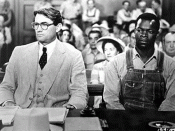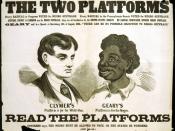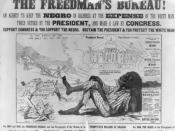In chapter twenty-three of the book To Kill a Mocking Bird the author talks about racism and why people belief what they do. Most of this chapter is a conversation between Atticus, Jem and Scout about why Tom Robinson was found guilty and why he might be sent to the electric chair. Scout and Jem don?t understand how anyone could convict him when the prosecution?s evidence is foggy at best and clearly they can not prove that Tom raped Mayella ?beyond a reasonable doubt.? They also discuss why good people don?t speak up to put down racism or negative behaviors. Atticus gets very emotional, but he tells the children ?Not time to worry yet, Scout?(pg.222.) Many people in that society dealt with their beliefs by not thinking about them. A lot of the people who lived in Maycomb weren?t even really racist. They just went with the crowd because they were afraid of what their peers would think if they defended a black man.
They were afraid the people would classify them as friends of the blacks.
I think that if all the people in the town who weren?t racist at heart would have stood up for their beliefs and said that they thought that Tom Robinson was innocent, there would have most likely been a very different outcome to the trial. It is sad that good people will just sit and watch something like that happen not doing anything when they could do or say something.
When people serve on a jury it challenges their beliefs and convictions. When serving on a jury you are under a lot of pressure because the fate of another human being lies in your hands. You are given the duty of hearing the evidence and making an impartial decision based on the evidence...


